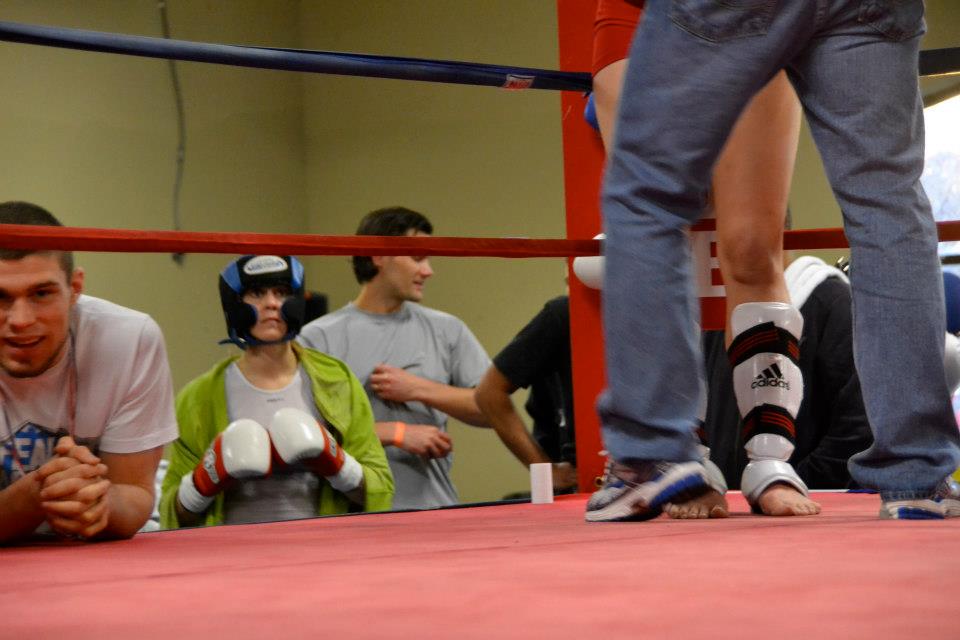
An interview with Nicole Maier: Enteric vaccine enthusiast and fighting champion

The brilliant scientists of PATH’s Enteric Vaccine Initiative (EVI) conduct clinical trials for vaccine candidates against bacterial forms of diarrheal disease. Next month, they will launch a trial for a Shigella vaccine in Bangladesh.
EVI team members have spent countless hours preparing for this moment. We sat down with Nicole Bauers to talk about her role in the process, her love affair with infectious disease research, and her hobbies outside the office.
Nicole, you are the Clinical and Regulatory Coordinator for the Enteric Vaccine Initiative at PATH. What does that mean?
Basically, this means I handle the regulatory requirements once a vaccine candidate is ready for a phase 1 human clinical trial. This includes trial protocol development, data management, data monitoring, and logistics.
That sounds like a lot of work!
I love it. I love seeing the data results in real time, rather than just at the beginning and the end of a trial. And I love new studies and dealing with the daily challenges that come my way.
I recently traveled to Bangladesh to do a practice walk-through of a Shigella vaccine clinical trial, which is EVI’s first clinical trial in a developing country. There are a lot more obstacles to planning a clinical trial overseas, like obtaining the proper licenses and necessary regulatory documents. We also needed to handle the logistics of shipping the vaccine in dry ice so they wouldn’t spoil.
When we got to Bangladesh, we learned that the vaccines were there, but stuck in customs. We had to wait for two days while the vaccines sat in a box of ice in the airport – so close, yet so far! We were so happy when we finally got the vaccines that we took a picture of it. Thankfully, our test of the vaccines showed they had survived the trip halfway around the world, plus a two-day waiting period in customs, in a box of dry ice. This is good news for a potential Shigella vaccine introduction in Bangladesh, where the Shigella disease burden is high.
So, enteric diseases, eh? Was it love at first sight?
I seriously love diseases. After studying biology in undergrad, I enrolled in an MPH but missed the nitty-gritty micro-science stuff, so I ended up getting a Masters in Science in Emerging Infectious Diseases. For my Masters practicum, I spent a month in rural Panama collecting information on viruses there. That’s when I knew I wanted to do down and dirty field work. Later on, when I worked at a contract research organization, I learned more about clinical trials. At that point, my knowledge grew beyond diseases and I learned about vaccine development work. Now I know I want to stay in this field.
What do you enjoy most about working at PATH?
I feel so proud when I think about how many enteric vaccine clinical trials we’ve done at PATH. I get emotional when I think about what we’ve accomplished.
Everyone here is so nice and everyone is brilliant. I’m always star-struck because I feel like I work with celebrities. John Clemens introduced himself to me in a meeting and I thought, “I know who you are! I’ve read all your manuscripts! I’ve tested your vaccine!” It was like I had met Tom Cruise. It makes me wonder, who will be the next generation of enteric vaccine celebrities?
Nicole Maier, perhaps?
I would love to be the Tom Cruise of enteric vaccines.
When you’re not building your enteric vaccine celebrity status, what do you do for fun?
I’m a pretty active person, so I enjoy working out. Since college, I’ve done running, yoga, and karate,  and I’ve recently taken up fighting.
and I’ve recently taken up fighting.
… Fighting? Like, with boxing gloves?
Yes – boxing and Muy Thai. I got into it because I’m obsessed with UFC [United Fighting Championship]. I have my second fighting match this weekend. I don’t think I should show my fighting videos around the office anymore; my team was concerned for me because I wasn’t wearing headgear.
Editor’s note: In case you were curious — Nicole owned that fighting match.
Be afraid, infectious diseases. Be very afraid.


